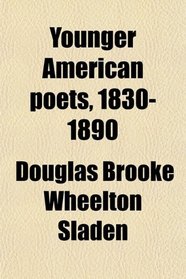Search -
Younger American poets, 1830-1890
Younger American poets 18301890
Author:
Purchase of this book includes free trial access to www.million-books.com where you can read more than a million books for free. This is an OCR edition with typos. Excerpt from book: College, the other, by Mrs Laurence Turnbull, of Baltimore, giving the cult of the Lanierophant. From Lanier it is natural to pass to Helen Hunt, born Helen F... more »
Author:
Purchase of this book includes free trial access to www.million-books.com where you can read more than a million books for free. This is an OCR edition with typos. Excerpt from book: College, the other, by Mrs Laurence Turnbull, of Baltimore, giving the cult of the Lanierophant. From Lanier it is natural to pass to Helen Hunt, born Helen F... more »
ISBN-13: 9780217958691
ISBN-10: 0217958699
Publication Date: 8/18/2009
Pages: 694
Rating: ?
ISBN-10: 0217958699
Publication Date: 8/18/2009
Pages: 694
Rating: ?
0 stars, based on 0 rating




